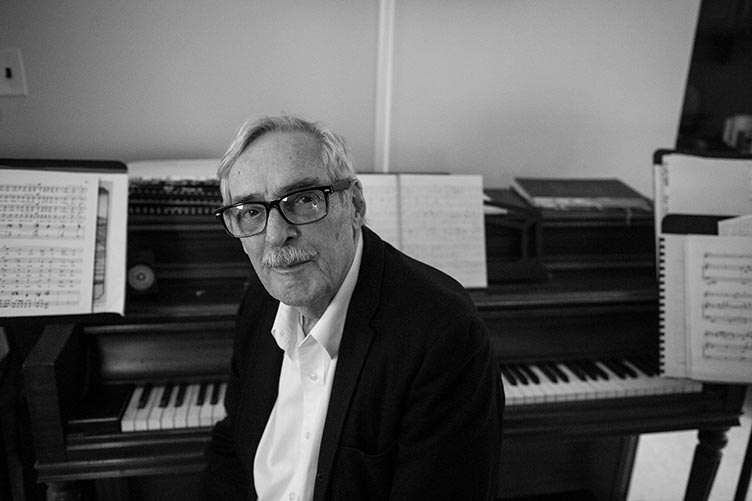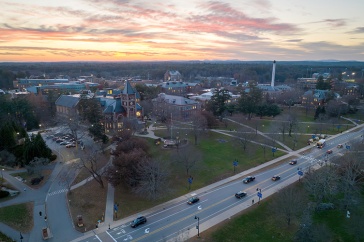
Richard Alan White ’58 (Photo: Rebecca White)
It started when he was a small child in Manchester, New Hampshire, hearing his mother prepare for her performances as a professional singer. It continued at UNH, where he received his degree in music. But it was at the age of 82 that Richard Alan White ’58 would see his passion for music reach a pinnacle few attain.
Last October, White’s opera “Hester” received its professional debut with two sold-out piano-vocal performances at the Center for Contemporary Opera in New York. His 900-page labor of love, written over the course of four decades, retells Nathaniel Hawthorne’s classic work, “The Scarlet Letter.” And with write-ups in The New York Times and on NHPR, White found himself in the limelight at an age when the majority of his classmates are well into retirement.
White’s journey to composing an opera for full orchestra and voices — with, as he puts it, “parts for everyone but the chandelier” — began early. Like the plot of a great story, however, his path was not a straight line: He would take myriad jobs to pay the bills and support his family, but through it all, music remained his true vocation from his earliest days.
“The important things in my life are what come first,” White says, speaking from his Brooklyn, New York, home studio. He recalls taking clarinet lessons and singing in churches and synagogues in the 1940s. At Manchester High School, he loved performing in Gilbert and Sullivan operettas, recalling how the curtain would go up on a tableau of actors frozen in place during “HMS Pinafore” and the audience would erupt into applause. “Little things like that, you always remember,” he says.
“This opera and all those 900 pages were put together with a No. 2 pencil.”
At UNH, he sang in the choir and studied music with professors like Donald Steele and Vincent Bleecker, whom he recalls to this day. After graduation, it was off to New York City, which included work in freelance orchestration and a master’s degree from Columbia in 1965. There were the odd singing jobs, all while studying at Herbert Bergdorf Studios with acclaimed theatre educators like Uta Hagen. “I performed in several off-off Broadway shows,” he says. He also took roles in television shows including “General Hospital” and even appeared as a photo-double for Bob Newhart in the movie “Marathon.”
However, the work of a journeyman tenor and freelance musician did not always pay well. Married with a family on the way, he went to work in social services, eventually taking a post as a security guard at Columbia before moving back to New Hampshire with his family to take a similar position at Daniel Webster College. In that work, he explains, “I was able to have a certain freeness of my mind that if I was a professor or a conductor, I wouldn’t have. I didn’t have to take my job home with me . . . and I composed every day.”
It was back in 1979 that he began writing “Hester.” He always liked “The Scarlet Letter,” he says, and felt a connection to the setting: His father and grandmother both were born in Salem, Massachusetts, where Hawthorne’s introduction to the story is set. Decades later, White’s opera is hundreds of pages longer than the work that inspired it. “This opera and all those 900 pages were put together with a No. 2 pencil,” he says.
So why opera? White says he knew his primary talent was composing, but his experience in theatre also inspired him. “When you add music and theatre together, you get opera.” The work of a composer is often, by necessity, solitary, but seeing his opera performed for the first time brought home an important truth. “The composer feels at the nerve center of everything,” he says, but, “you cannot do things by yourself. It is the director, manager — all the pieces to make this possible.”
Originally published in UNH Magazine Spring 2018 Issue
-
Written By:
Jennifer Saunders | Communications and Public Affairs | jennifer.saunders@unh.edu | 603-862-3585
















































